Allen and I went canoeing in the Portage River on Sunday. My favorite part was when we paddled into the shallows to watch the big carp spawn. Today we did some last minute shopping for the P-Town adventure. The next time I post will be from P-Town.
Very nice article about my residency here!
Wednesday, May 28, 2008
Saturday, May 24, 2008
Friday, May 23, 2008
Misc.
1. Dentist yesterday. Full series of x-rays, cleaning, replaced filling, new fillings. Sore mouth today.
2. Going to see Prince Caspian tonight with Allen and the boys!
3. Allen finished making the bike rack for our trip to Provincetown--coming soon!
4. Surprise! David Cook won American Idol! I let out a whoop. Yay.
2. Going to see Prince Caspian tonight with Allen and the boys!
3. Allen finished making the bike rack for our trip to Provincetown--coming soon!
4. Surprise! David Cook won American Idol! I let out a whoop. Yay.
Tuesday, May 13, 2008
In the News
I just heard:
Rest in peace Robert Rauschenberg.
Rest in peace Robert Rauschenberg.
Labels:
arts and crafts,
death,
Robert Rauschenberg
Provincetown / 10
Just worked through the whole night long, researching and writing. I shall, I hope, be hitting the ground running at Provincetown!
"Miriam"
Truman Capote's "Miriam" is usually described as a horror tale. It was published in 1945, more than twenty years before In Cold Blood would truly make him famous.
The main character is Mrs. H. T. Miller (Miriam) who lives a nondescript life on money from her husband's insurance policy. She stays in an apartment near the East River, is 61, and tends a canary.
One day, she meets a small girl, also named Miriam. We never find out if Miriam is real or a figment of the main character's imagination. If little Miriam exists only in Mrs. H. T. Miller's imagination, we don't know if this overactive imagination has something to do with loneliness or dementia or something else.
What cannot be disputed is that once the little girl attaches herself to Mrs. H. T. Miller, she refuses to go away.
After I reread this story a few days back, I thought about it over night. I'm wondering if perhaps Miriam the 61 year old woman and Miriam the little girl the same person. That is, the older Miriam is being somehow visited by a younger version of herself. The description of the young Miriam is intriguing. She has strange hair--"absolutely silver-white, like an albino's."
We know that Truman Capote also had white hair as a child--the hair is described by Scout in To Kill a Mockingbird, and most people acknowledge that Harper Lee's white-haired boy, the strange boy in her novel, is based on Truman Capote. Lee and Capote were childhood friends.
We also know that Truman Capote felt abandoned by his mother and his father. Little Miriam also seems to be abandoned by anyone who once loved her.
If "Miriam" had come later in Capote's career, I would be tempted to say that he wrote the story as a way to accuse himself of abandoning what was true about his life. In the story, for example, little Miriam derides the older Miriam for a "paper rose" in a vase. "Imitation," the little girl says, "How sad. Aren't imitations sad?"
The little girl also complains about many other aspects of Mrs. H. T. Miller's life, disturbs the old woman's sleeping canary, steels a brooch, and demands to be fed.
Because the story was one of Capote's first, I wonder if perhaps Capote somehow understood, even from a young age, that the big battle in his life would have something to do with authenticity.
The main character is Mrs. H. T. Miller (Miriam) who lives a nondescript life on money from her husband's insurance policy. She stays in an apartment near the East River, is 61, and tends a canary.
One day, she meets a small girl, also named Miriam. We never find out if Miriam is real or a figment of the main character's imagination. If little Miriam exists only in Mrs. H. T. Miller's imagination, we don't know if this overactive imagination has something to do with loneliness or dementia or something else.
What cannot be disputed is that once the little girl attaches herself to Mrs. H. T. Miller, she refuses to go away.
After I reread this story a few days back, I thought about it over night. I'm wondering if perhaps Miriam the 61 year old woman and Miriam the little girl the same person. That is, the older Miriam is being somehow visited by a younger version of herself. The description of the young Miriam is intriguing. She has strange hair--"absolutely silver-white, like an albino's."
We know that Truman Capote also had white hair as a child--the hair is described by Scout in To Kill a Mockingbird, and most people acknowledge that Harper Lee's white-haired boy, the strange boy in her novel, is based on Truman Capote. Lee and Capote were childhood friends.
We also know that Truman Capote felt abandoned by his mother and his father. Little Miriam also seems to be abandoned by anyone who once loved her.
If "Miriam" had come later in Capote's career, I would be tempted to say that he wrote the story as a way to accuse himself of abandoning what was true about his life. In the story, for example, little Miriam derides the older Miriam for a "paper rose" in a vase. "Imitation," the little girl says, "How sad. Aren't imitations sad?"
The little girl also complains about many other aspects of Mrs. H. T. Miller's life, disturbs the old woman's sleeping canary, steels a brooch, and demands to be fed.
Because the story was one of Capote's first, I wonder if perhaps Capote somehow understood, even from a young age, that the big battle in his life would have something to do with authenticity.
The soliloquy
"Why has my motley diary no jokes? Because it is a soliloquy and every man is grave alone." --Ralph Waldo Emerson
Saturday, May 10, 2008
Provincetown / 9
Today has been busy. Allen and I have been making preparations for Provincetown. The biggest part of the weight falls on Allen, who worked all day making a truck cap to keep things dry and safe. I've spent the day gathering the books I want to take. There are so many. I think of Annie Dillard who spent a year in a cabin and later wrote Pilgrim at Tinker Creek. She checked dozens of books out of the library, checking facts, making connections. It's that way for me. There are so many aspects of life that I want to bring into my next novel.
As I was gathering, I suddenly remembered that I have to take every book I have on James Wright, since our boat stop in Martins Ferry was important. I also must take every book I have on biology, Ohio, rivers, mysticism, and fairy tales. And more. That is going to be a load of books.
Last night I reread Capote's "Miriam." I was stunned anew at what a great story it is. Interpretations abound. I thought and thought about the story's meaning last night. I will write about it soon.
As I was gathering, I suddenly remembered that I have to take every book I have on James Wright, since our boat stop in Martins Ferry was important. I also must take every book I have on biology, Ohio, rivers, mysticism, and fairy tales. And more. That is going to be a load of books.
Last night I reread Capote's "Miriam." I was stunned anew at what a great story it is. Interpretations abound. I thought and thought about the story's meaning last night. I will write about it soon.
Labels:
Annie Dillard,
books,
Capote,
Pilgrim at Tinker Creek,
Provincetown,
Writing
Friday, May 09, 2008
Thursday, May 08, 2008
Things that made me sad today
1. Allen found out the gas station sold him some bogus gas and the gas damaged his boat motor.
2. Jason Castro got voted off of American Idol. He is the only contestant on Idol ever to make me cry with a song. His "Somewhere Over the Rainbow" is quietly beautiful.
3. I found the old leather hat my husband has been looking for. It looked sad without him.
2. Jason Castro got voted off of American Idol. He is the only contestant on Idol ever to make me cry with a song. His "Somewhere Over the Rainbow" is quietly beautiful.
3. I found the old leather hat my husband has been looking for. It looked sad without him.
Wednesday, May 07, 2008
Provincetown / 8
One of my favorite poems is "Tetelestai!" by Conrad Aiken. I listened to and loved this poem a long time before it occurred me to look more deeply into the meaning of "Tetelestai."
Tetelestai comes from the verb teleo, which means “to bring to an end, to complete, to accomplish.” It's the word you would use to describe your life when you feel yourself, your life, to be in a state of completion.
Aiken's poem is about the ache in the bones that results from the unfinished life, the feeling that things have not come together exactly as they should, the feeling that the speaker has failed in significant ways. In one stanza, the speaker contemplates how one often feels fragile, like a failure, or incomplete:
. . .Look! this flesh how it crumbles to dust and is blown!
These bones, how they grind in the granite of frost and are nothing!
This skull, how it yawns for a flicker of time in the darkness,
Yet laughs not and sees not! It is crushed by a hammer of sunlight,
And the hands are destroyed. . .
Press down through the leaves of the jasmine,
Dig through the interlaced roots--nevermore will you find me;
I was no better than dust, yet you cannot replace me. . .
Take the soft dust in your hand--does it stir: does it sing?
Has it lips and a heart? Does it open its eyes to the sun?
Does it run, does it dream, does it burn with a secret, or tremble
In terror of death? Or ache with tremendous decisions?
. . .Listen!. . .It says: 'I lean by the river. The willows
Are yellowed with bud. White clouds roar up from the south
And darken the ripples; but they cannot darken my heart,
Nor the face like a star in my heart!. . .Rain falls on the water
And pelts it, and rings it with silver. The willow trees glisten,
The sparrows chirp under the eaves; but the face in my heart
Is a secret of music. . .I wait in the rain and am silent.
'Listen again!. . .
It says: 'I have worked, I am tired,
The pencil dulls in my hand: I see through the window
Walls upon walls of windows with faces behind them,
Smoke floating up to the sky, an ascension of sea-gulls.
I am tired. I have struggled in vain, my decision was fruitless,
Why then do I wait? with darkness, so easy, at hand!. . .
But tomorrow, perhaps. . .I will wait and endure till tomorrow!'. . .
Or again: 'It is dark. The decision is made. I am vanquished
By terror of life. The walls mount slowly about me
In coldness. I had not the courage. I was forsaken.
I cried out, was answered by silence. . .Tetélestai!. . .'
I love the phrase "ache with tremendous decisions." To me it means being at the point of crisis.
I've learned to recognize small moments within myself when I experience a point of crisis. These are blips on the radar screen of my consciousness when I realize I'm doubtful or unsettled. It used to be something I would try to shrug off. Now I pay attention.
These episodes require me to make small adjustments to my expectations and to my image of myself. Often I withdraw to a quiet place to think. Sometimes I temporarily lose focus and commitment.
A friend of ours recently told Allen that each of us is really three people: the person we think we are, the person others think we are, and the person we want to be.
There's truth in that, I think. What interests me now is in how this applies to my creative life. I wonder about my fears, the ones I've probably not yet even admitted to myself. Writing is a primal experience...as such, anything can happen.
I'm not, as Aiken's speaker admits, "vanquished." Just quietly considering things. I'm struggling with my image of myself, with my sense of what it means to be a "creative" person, but I'm not struggling in vain. The reason I started the blog was so I would have a way to explore what it means to have a creative life. What it means to commit yourself to that.
But, still, I'm a long way from being able to cry "Tetelestai!"
I would describe myself as being at a "point of crisis," but that isn't a bad thing. It just means I'm awake. I'm sorting through things. I'm aware. That's where I want to be, right on the edge of a thing, of something so vague I don't have words for it yet.
In my personal life I am content; in my writing life, no. As Roethke said, "The edge is what I have."
Here's to Provincetown and any perspective it has to offer!
Tetelestai comes from the verb teleo, which means “to bring to an end, to complete, to accomplish.” It's the word you would use to describe your life when you feel yourself, your life, to be in a state of completion.
Aiken's poem is about the ache in the bones that results from the unfinished life, the feeling that things have not come together exactly as they should, the feeling that the speaker has failed in significant ways. In one stanza, the speaker contemplates how one often feels fragile, like a failure, or incomplete:
. . .Look! this flesh how it crumbles to dust and is blown!
These bones, how they grind in the granite of frost and are nothing!
This skull, how it yawns for a flicker of time in the darkness,
Yet laughs not and sees not! It is crushed by a hammer of sunlight,
And the hands are destroyed. . .
Press down through the leaves of the jasmine,
Dig through the interlaced roots--nevermore will you find me;
I was no better than dust, yet you cannot replace me. . .
Take the soft dust in your hand--does it stir: does it sing?
Has it lips and a heart? Does it open its eyes to the sun?
Does it run, does it dream, does it burn with a secret, or tremble
In terror of death? Or ache with tremendous decisions?
. . .Listen!. . .It says: 'I lean by the river. The willows
Are yellowed with bud. White clouds roar up from the south
And darken the ripples; but they cannot darken my heart,
Nor the face like a star in my heart!. . .Rain falls on the water
And pelts it, and rings it with silver. The willow trees glisten,
The sparrows chirp under the eaves; but the face in my heart
Is a secret of music. . .I wait in the rain and am silent.
'Listen again!. . .
It says: 'I have worked, I am tired,
The pencil dulls in my hand: I see through the window
Walls upon walls of windows with faces behind them,
Smoke floating up to the sky, an ascension of sea-gulls.
I am tired. I have struggled in vain, my decision was fruitless,
Why then do I wait? with darkness, so easy, at hand!. . .
But tomorrow, perhaps. . .I will wait and endure till tomorrow!'. . .
Or again: 'It is dark. The decision is made. I am vanquished
By terror of life. The walls mount slowly about me
In coldness. I had not the courage. I was forsaken.
I cried out, was answered by silence. . .Tetélestai!. . .'
I love the phrase "ache with tremendous decisions." To me it means being at the point of crisis.
I've learned to recognize small moments within myself when I experience a point of crisis. These are blips on the radar screen of my consciousness when I realize I'm doubtful or unsettled. It used to be something I would try to shrug off. Now I pay attention.
These episodes require me to make small adjustments to my expectations and to my image of myself. Often I withdraw to a quiet place to think. Sometimes I temporarily lose focus and commitment.
A friend of ours recently told Allen that each of us is really three people: the person we think we are, the person others think we are, and the person we want to be.
There's truth in that, I think. What interests me now is in how this applies to my creative life. I wonder about my fears, the ones I've probably not yet even admitted to myself. Writing is a primal experience...as such, anything can happen.
I'm not, as Aiken's speaker admits, "vanquished." Just quietly considering things. I'm struggling with my image of myself, with my sense of what it means to be a "creative" person, but I'm not struggling in vain. The reason I started the blog was so I would have a way to explore what it means to have a creative life. What it means to commit yourself to that.
But, still, I'm a long way from being able to cry "Tetelestai!"
I would describe myself as being at a "point of crisis," but that isn't a bad thing. It just means I'm awake. I'm sorting through things. I'm aware. That's where I want to be, right on the edge of a thing, of something so vague I don't have words for it yet.
In my personal life I am content; in my writing life, no. As Roethke said, "The edge is what I have."
Here's to Provincetown and any perspective it has to offer!
Tuesday, May 06, 2008
Provincetown / 7
Things I must do before going to Provicetown for the summer:
1. Clean my house.
2. Sleep next to my husband.
3. Pet my cats.
4. Give Milk Bone treats to our dogs.
5. Listen to the train in the dark.
1. Clean my house.
2. Sleep next to my husband.
3. Pet my cats.
4. Give Milk Bone treats to our dogs.
5. Listen to the train in the dark.
Monday, May 05, 2008
Provincetown / 6
Sometimes I begin to wonder how much I will like Provincetown, or if I will like it. Will it be okay, being away from my family for so long? Will it be noisy there? Will there be drama? Fire? Death? Storms? Will the ideas come? Will I get ink on paper? Will what I write be any good?
Kenneth Patchen's poem, "Where" reminds me that no matter where you go, there you are:
Where?
by Kenneth Patchen
There's a place the man always say
Come in here, child
No cause you should weep
Wolf never catch the rabbit
Golden hair never turn white with grief
Come in here, child
No cause you should moan
Brother never hurt his brother
Nobody here ever wander without a home
There must be some such place somewhere
But I never heard of it
Kenneth Patchen's poem, "Where" reminds me that no matter where you go, there you are:
Where?
by Kenneth Patchen
There's a place the man always say
Come in here, child
No cause you should weep
Wolf never catch the rabbit
Golden hair never turn white with grief
Come in here, child
No cause you should moan
Brother never hurt his brother
Nobody here ever wander without a home
There must be some such place somewhere
But I never heard of it
Friday, May 02, 2008
Provincetown / 5
I meditated on another Theodore Roethke poem before I went to bed last night. The poem is "Memory."
Then during the night I dreamed that I was in Provincetown asking many strangers what was wrong with my "new" book, asking them to help me right it.
Memory
by Theodore Roethke
In the slow world of dream,
We breathe in unison.
The outside dies within,
And she knows all I am.
She turns, as if to go,
Half-bird, half-animal.
The wind dies on the hill.
Love's all. Love's all I know.
A doe drinks by a stream,
A doe and its fawn.
When I follow after them,
The grass changes to stone.
Then during the night I dreamed that I was in Provincetown asking many strangers what was wrong with my "new" book, asking them to help me right it.
Memory
by Theodore Roethke
In the slow world of dream,
We breathe in unison.
The outside dies within,
And she knows all I am.
She turns, as if to go,
Half-bird, half-animal.
The wind dies on the hill.
Love's all. Love's all I know.
A doe drinks by a stream,
A doe and its fawn.
When I follow after them,
The grass changes to stone.
Labels:
dreams,
Provincetown,
Theodore Roethke,
Writing
Provincetown / 4
It has been a long time since I've been to the beach. I spend time on Lake Erie, but the area around a Lake is not a beach, even if people call it that. I grew up in Eastern NC, very close to the Beach, within 20 miles or so. My early childhood memories of the beach are not that happy. My father would sit in the pavilion and drink too much beer, get surly, and in the evening drive much too recklessly home.
Adulthood was better. I have good memories of going to the beach with Allen and our children. Allen used to help the boys build fabulous sand castles. There would be moments, usually as the sun was going down, that I'd stare at the waves and feel peaceful. I never thought I'd get a chance to feel that again. I never visit NC anymore, not since both parents died.
The last time I saw the beach was sometime in the early 1990s. We were visiting my parents and it came a terrific snow storm. Snow is so rare there that mother accused us of bringing the snow with us from Ohio. The next day most of it melted and Allen and I, against my mother's wishes (she never wanted us to leave her house when we were visiting; it made her so angry at us) drove to the beach because we wanted to see snow on the beach.
I'm trying to grasp how it will be at Provincetown, living within walking distance of the ocean. I must take my Walt Whitman with me and my Roethke and study how they wrote about the sea. I've forgotten the feeling of being at one while watching the force of the waves. I was on the Pacific coast last September because I taught workshops at Esalen. But the Atlantic and the Pacific are thoroughly different places. There is a majestic quality to the Northern California beaches. But I've missed the Atlantic. Until now I hadn't realized how much I've missed it. It's been much too long.
Adulthood was better. I have good memories of going to the beach with Allen and our children. Allen used to help the boys build fabulous sand castles. There would be moments, usually as the sun was going down, that I'd stare at the waves and feel peaceful. I never thought I'd get a chance to feel that again. I never visit NC anymore, not since both parents died.
The last time I saw the beach was sometime in the early 1990s. We were visiting my parents and it came a terrific snow storm. Snow is so rare there that mother accused us of bringing the snow with us from Ohio. The next day most of it melted and Allen and I, against my mother's wishes (she never wanted us to leave her house when we were visiting; it made her so angry at us) drove to the beach because we wanted to see snow on the beach.
I'm trying to grasp how it will be at Provincetown, living within walking distance of the ocean. I must take my Walt Whitman with me and my Roethke and study how they wrote about the sea. I've forgotten the feeling of being at one while watching the force of the waves. I was on the Pacific coast last September because I taught workshops at Esalen. But the Atlantic and the Pacific are thoroughly different places. There is a majestic quality to the Northern California beaches. But I've missed the Atlantic. Until now I hadn't realized how much I've missed it. It's been much too long.
Thursday, May 01, 2008
Provincetown / 3
Like Theodore Roethke, "I dream of journeys repeatedly." Most of the time, these journeys end in disaster or are impeded by obstacles impossible to overcome. I cross bridges: they are full of holes and fall apart. They have huge gaps I cannot jump. I climb steps: they end. They break apart and sway perilously. Doors will not open.
I have dreamed about Provincetown, too. I see a road that circles around. Inside the circle is a monument. Trees. I am lost.
As far as the real Provincetown: I am hoping to find myself there.
from The Far Field
by Theodore Roethke
I dream of journeys repeatedly:
Of flying like a bat deep into a narrowing tunnel,
Of driving alone, without luggage, out a long peninsula,
The road lined with snow-laden second growth,
A fine dry snow ticking the windshield,
Alternate show and sleet, no on-coming traffic,
And no lights behind, in the blurred side-mirror,
The road changing from glazed tarface to a rubble of stone,
Ending at last in a hopeless sand-rut,
Where the car stalls,
Churning in a snowdrift
Until the headlights darken. ...
The lost self changes,
Turning toward the sea,
A sea-shape turning around, --
As old man with his feet before the fire,
In robes of green, in garments of adieu. ...
All finite things reveal infinitude:
The mountain with its singular bright shade
Like the blue shine on freshly frozen snow,
The after-light upon ice-burdened pines;
Odor of basswood on the mountain-slope,
A scent beloved of bees;
Silence of water above a sunken tree:
The pure serene of memory in one man, --
A ripple widening from a single stone
Winding around the waters of the world.
I have dreamed about Provincetown, too. I see a road that circles around. Inside the circle is a monument. Trees. I am lost.
As far as the real Provincetown: I am hoping to find myself there.
from The Far Field
by Theodore Roethke
I dream of journeys repeatedly:
Of flying like a bat deep into a narrowing tunnel,
Of driving alone, without luggage, out a long peninsula,
The road lined with snow-laden second growth,
A fine dry snow ticking the windshield,
Alternate show and sleet, no on-coming traffic,
And no lights behind, in the blurred side-mirror,
The road changing from glazed tarface to a rubble of stone,
Ending at last in a hopeless sand-rut,
Where the car stalls,
Churning in a snowdrift
Until the headlights darken. ...
The lost self changes,
Turning toward the sea,
A sea-shape turning around, --
As old man with his feet before the fire,
In robes of green, in garments of adieu. ...
All finite things reveal infinitude:
The mountain with its singular bright shade
Like the blue shine on freshly frozen snow,
The after-light upon ice-burdened pines;
Odor of basswood on the mountain-slope,
A scent beloved of bees;
Silence of water above a sunken tree:
The pure serene of memory in one man, --
A ripple widening from a single stone
Winding around the waters of the world.
Subscribe to:
Posts (Atom)
Pages
Dreaming
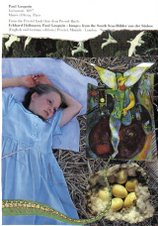
About Me

- Theresa Williams
- Northwest Ohio, United States
- "I was no better than dust, yet you cannot replace me. . . Take the soft dust in your hand--does it stir: does it sing? Has it lips and a heart? Does it open its eyes to the sun? Does it run, does it dream, does it burn with a secret, or tremble In terror of death? Or ache with tremendous decisions?. . ." --Conrad Aiken
Followers
Facebook Badge
Search This Blog
Favorite Lines
My Website
Epistle, by Archibald MacLeish
Visit my Channel at YouTube
Great Artists
www.flickr.com
This is a Flickr badge showing public photos from theresarrt7. Make your own badge here.
Fave Painting: Eden
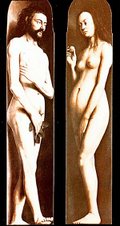
Fave Painting: The Three Ages of Man and Death

by Albrecht Dürer
From the First Chapter
The Secret of Hurricanes : That article in the Waterville Scout said it was Shake- spearean, all that fatalism that guides the Kennedys' lives. The likelihood of untimely death. Recently, another one died in his prime, John-John in an airplane. Not long before that, Bobby's boy. While playing football at high speeds on snow skis. Those Kennedys take some crazy chances. I prefer my own easy ways. Which isn't to say my life hasn't been Shake-spearean. By the time I was sixteen, my life was like the darkened stage at the end of Hamlet or Macbeth. All littered with corpses and treachery.
My Original Artwork: Triptych
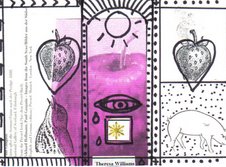
Wishing
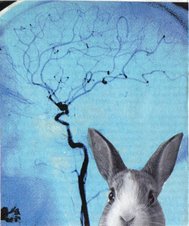
Little Deer
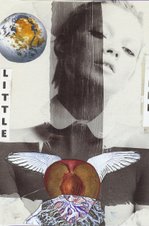
Transformation
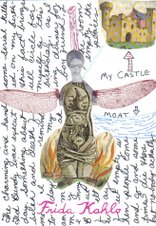
Looking Forward, Looking Back
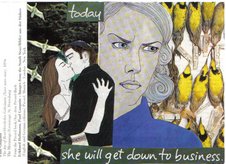
CURRENT MOON
Labels
- adolescence (1)
- Airstream (7)
- Alain de Botton (1)
- all nighters (2)
- Allen (1)
- altars (1)
- Angelus Silesius (2)
- animals (1)
- Annie Dillard (1)
- Antonio Machado (2)
- AOL Redux (1)
- April Fool (1)
- Archibald MacLeish (1)
- arts and crafts (55)
- Auden (1)
- awards (2)
- AWP (2)
- Bach (1)
- Basho (5)
- Beauty and the Beast (1)
- birthdays (1)
- blogs (5)
- boats (2)
- body (2)
- books (7)
- bookstores (1)
- Buddha (1)
- Buddha's Little Instruction Book (2)
- butterfly (4)
- buzzard (2)
- Capote (4)
- Carmel (1)
- Carson McCullers (1)
- cats (15)
- Charles Bukowski (1)
- Charles Simic (2)
- Christina Georgina Rossetti (1)
- church (2)
- confession (1)
- Conrad Aiken (1)
- cooking (5)
- crows (1)
- current events (2)
- D. H. Lawrence (3)
- death (6)
- Delmore Schwartz (4)
- detachment (1)
- dogs (7)
- domestic (3)
- dreams (21)
- Edward Munch (4)
- Edward Thomas (1)
- Eliot (3)
- Eliot's Waste Land (2)
- Emerson (2)
- Emily Dickinson (10)
- ephemera (1)
- Esalen (6)
- essay (3)
- Eugene O'Neill (3)
- Ezra Pound (1)
- F. Scott Fitzgerald (1)
- fairy tales (7)
- Fall (16)
- Famous Quotes (16)
- festivals (2)
- fire (5)
- Floreta (1)
- food (1)
- found notes etc. (1)
- found poem (2)
- fragments (86)
- Frida Kahlo (1)
- frogs-toads (4)
- Georg Trakl (1)
- gifts (1)
- Global Warming (1)
- Gluck (1)
- goats (1)
- Goodwill (1)
- Great lines of poetry (2)
- Haibun (15)
- haibun moleskine journal 2010 (2)
- Haiku (390)
- Hamlet (1)
- Hart Crane (4)
- Hayden Carruth (1)
- Henry Miller (1)
- holiday (12)
- Hyman Sobiloff (1)
- Icarus (1)
- ikkyu (5)
- Imagination (7)
- Ingmar Bergman (1)
- insect (2)
- inspiration (1)
- Issa (5)
- iTunes (1)
- Jack Kerouac (1)
- James Agee (2)
- James Dickey (5)
- James Wright (6)
- John Berryman (3)
- Joseph Campbell Meditation (2)
- journaling (1)
- Jung (1)
- Juniper Tree (1)
- Kafka (1)
- Lao Tzu (1)
- letters (1)
- light (1)
- Lorca (1)
- Lorine Niedecker (2)
- love (3)
- Lucille Clifton (1)
- Marco Polo Quarterly (1)
- Marianne Moore (1)
- Modern Poetry (14)
- moon (6)
- movies (20)
- Muriel Stuart (1)
- muse (3)
- music (8)
- Mystic (1)
- mythology (6)
- nature (3)
- New Yorker (2)
- Nietzsche (1)
- Northfork (2)
- November 12 (1)
- October (6)
- original artwork (21)
- original poem (53)
- Our Dog Buddha (6)
- Our Dog Sweet Pea (7)
- Our Yard (6)
- PAD 2009 (29)
- pad 2010 (30)
- Persephone (1)
- personal story (1)
- philosophy (1)
- Phoku (2)
- photographs (15)
- Picasso (2)
- Pilgrim at Tinker Creek (1)
- Pillow Book (5)
- Pinsky (2)
- plays (1)
- poem (11)
- poet-seeker (9)
- poet-seer (6)
- poetry (55)
- politics (1)
- poppies (2)
- presentations (1)
- Provincetown (51)
- Publications (new and forthcoming) (13)
- rain (4)
- Randall Jarrell (1)
- reading (6)
- recipes (1)
- Reciprocity (1)
- Richard Brautigan (3)
- Richard Wilbur (2)
- Rilke (5)
- river (5)
- river novel (1)
- rivers (12)
- Robert Frost (2)
- Robert Rauschenberg (1)
- Robert Sean Leonard (1)
- Robinson Jeffers (1)
- Rollo May (2)
- Rumi (1)
- Ryokan (1)
- Sexton (1)
- short stories (13)
- skeletons (2)
- sleet (1)
- snake (1)
- Snow (24)
- solitude (1)
- spider (2)
- spring (1)
- Stanley Kunitz (1)
- students (2)
- suffering (4)
- suicide (2)
- summer (20)
- Sylvia Plath (2)
- Talking Writing (1)
- Tao (3)
- teaching (32)
- television (4)
- the artist (2)
- The Bridge (3)
- The Letter Project (4)
- The Shining (1)
- Thelma and Louise (1)
- Theodore Roethke (16)
- Thomas Gospel (1)
- Thomas Hardy (1)
- toys (3)
- Transcendentalism (1)
- Trickster (2)
- Trudell (1)
- Ursula LeGuin (1)
- vacation (10)
- Vermont (6)
- Virginia Woolf (1)
- Vonnegut (2)
- Wallace Stevens (1)
- Walt Whitman (8)
- weather (7)
- website (3)
- what I'm reading (2)
- William Blake (2)
- William Butler Yeats (5)
- wind (3)
- wine (2)
- winter (24)
- wood (3)
- Writing (111)
- Zen (1)




